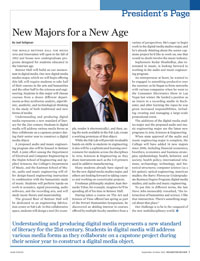President's Page
The Ronald Rettner Hall for Media Arts and Innovation will open in the fall of 2013 and house new undergraduate programs designed for students educated in the Internet age.
Rettner Hall will build on our momentum in digital media. Our new digital media studies major, which we will begin offering this fall, will require students to take half of their courses in the arts and humanities and the other half in the sciences and engineering. Students in this major will choose courses from a dozen different departments as they synthesize analytic, algorithmic, aesthetic, and technological thinking in the study of both traditional and new forms of media.
Understanding and producing digital media represents a new standard of literacy for the 21st century. Students in digital media will address various media forms as they collaborate on a capstone project during their senior year to construct a digital media object.
A proposed audio and music engineering program also will be housed in Rettner Hall. A joint effort among the Department of Electrical and Computer Engineering in the Hajim School of Engineering and Applied Sciences, the College’s Department of Music, and the Eastman School of Music, audio and music engineering will offer design-based engineering instruction in combination with the humanistic study of music. Students will perform hands-on work in acoustics, signal processing, audio software, and the recording arts, and will study music theory and musicianship.
The ground floor of Rettner Hall will be dedicated to an engineering fabrication center or Fab Lab. In this collaborative space, students will design a tool (for example, render it electronically), and then, using the tools available in the Fab Lab, create a working prototype of that object. While the Fab Lab will provide invaluable hands-on skills to students in engineering, it also will be a sophisticated learning environment for students across the disciplines in Arts, Sciences & Engineering as they share instruments such as the 3-D printers used in additive manufacturing.
Many students already have signed up for the new digital media studies major, and others are looking forward to taking courses and working on cocurricular projects. Freshman philosophy student Juan Bernardo Tobar, for example, imagines he’ll be spending all of his time in Rettner Hall. Having taken a course on The Art and Science of Time offered last spring as part of the Ferrari Humanities Symposium, he discovered an abiding interest in courses offered by multiple faculty members from a variety of perspectives. He’s eager to begin work in the digital media studies major, and he’s already thinking about the senior capstone project he’d like to work on, one that would no doubt involve the music industry.
Sophomore Kedar Shashidhar, also interested in music, is looking forward to working in the audio and music engineering program. An entrepreneur at heart, he wanted to be engaged in something productive over the summer, so he began to form networks with various companies when he went to the Consumer Electronics Show in Las Vegas last winter. He landed a position as an intern in a recording studio in Rochester, and after learning the ropes he was given increased responsibilities, including creating and managing a large-scale promotional event.
The additions of the digital media studies major and the proposed audio and music engineering major are the latest new programs in Arts, Sciences & Engineering. When state approval of the audio and music engineering major is complete, the College will have added 14 new majors since 2006, including financial economics; bioethics; economics and business strategies; epidemiology; health, behavior, and society; health policy; international relations; archaeology, technology, and historical structures; computer science (as a BA option); optical engineering; American studies; the Barry Florescue Undergraduate Business Degree Program; digital media studies; and audio and music engineering.
To put this in different terms, the late Steve Jobs memorably remarked, “the intersection of humanities and science. I like that intersection. There’s something magical about that place.”
Our challenge is to be in the vanguard of the new multidisciplinary world.

